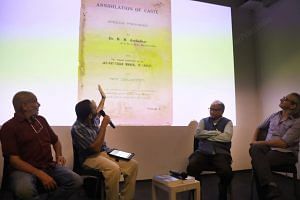New Delhi: Here’s a question. What can possibly bring Israeli Jewish scholars, fervent Ambedkarites and Dalits together in Delhi?
A Hebrew translation of Annihilation of Caste.
Eighty-seven years after B.R. Ambedkar’s seminal, groundbreaking volumes were published, Tel Aviv-based architect and author Sharon Rotbard has taken it to Israel.
“I was very impressed by Ambedkar. I think he was one of the brightest minds of the 20th century,” said Rotbard.
The book, which helped him understand caste division in Indian society, also allowed him to decode Israel and European societies. “There is a very important universal message in his writings. They deal with principles that could be implemented or give new insights to other societies as well,” he said.

Ambedkar’s ideas on social differences cannot be limited just to India, Rotbard declared at the launch of the book inside a small studio tucked away in South Delhi’s Khirki Extension with 30 guests. The question of caste and Ambedkar’s text address a problem with broader implications. But they also have a bearing on the prevalent Marxist thinking across the world that only recognises class fissures.
“Without comparing, I think I find it very useful how Ambedkar conceptualised the idea of society and the idea of differences in such a manner that somehow rectify the materialistic thinking of Marx,” said Rotbard, citing examples of how family origin and family names subtly establish identity in countries like France and Israel.
“Within the Israeli society, there are other components of society or identity that are not necessarily related to how much I earn or have inherited but to maybe more ancient origins such as historical or geographical origins of the family.”
We don’t have much control over such things, though, he said. “No one can decide the colour of [their] eyes, skin or hair. In some cases, this burden of identity is something that may cause suffering to many people,” he added.
The Hebrew translation was a step closer to the monumental attempt at globalising the legacy of Ambedkar, “the great philosopher of equality”, said S. Anand, co-founder of Navayana Publishing, which published Ambedkar’s book in 2014 with an introduction by Booker Prize-winning author Arundhati Roy. Rotbard discovered the book in 2016, which prompted him to spearhead a project that eventually introduced the title to Israeli readers through his publishing house, Babel.
The conversations at the gathering covered a range of tough questions—why Ambedkar never achieved popularity beyond India’s borders, why US states like Seattle and San Francisco had to pass anti-caste bills and how a foreigner could engage with a figure who championed the cause of Dalits – a movement deeply rooted in the Indian cultural landscape?
Also read:
India’s ‘unfortunate culture of defamation’
Rotbard was one of the four people on the panel comprising Israeli artist and OP Jindal Global University professor Achia Anzi (who proclaimed he was “some kind of a Gandhian”), Jawaharlal Nehru University professor Y.S. Alone and Anand. For a subject like Ambedkar, who started a “struggle to reclaim the human personality”, the discussion was bound to be serious and intellectually stimulating. Some even took notes of every word spoken.

Alone, who dominated most of the evening, took an acerbic tone during the discussion. While building an argument about the significance of the Annihilation of Caste, he described India as a country that’s a “fantastic” supplier of labourers, from doctors to scientists to sweepers, which also has an unfortunate “culture of defamation” where one can lynch, rape and abuse anyone on the streets, in homes and in public spaces. This, he concluded, was an “outcome of bypassing Ambedkar’s Annihilation of Caste project in the entire life of India’s democracy”.
However, discussions weren’t limited to Ambedkar’s speech from 1936, which he could never deliver. They also looked extensively at Ambedkar as the architect of the Constitution, looking at debates where he advocated for the creation of ‘enabling processes’ and the establishment of aspirational values for the betterment of society.
“The untouchables of India never asked the government to give them free ration…The demand was you should have that kind of purchasing power, and policies should create that power,” Alone said.
Also read: ‘Gandhiji, I have no homeland’—When Ambedkar said Dalits can’t depend on Congress
Why Ambedkar never became international
The no-frills book launch also witnessed a debate on the enduring binary of Ambedkar versus M.K. Gandhi.
A comparison was drawn between Gandhi, who catapulted to international fame, and Ambedkar, his professional and political contemporary, who fell far behind. According to Anand, the only other foreign translation of the text has been in Italian – Navayana’s edition was translated by an Italian publisher, Castelvecchi, in 2017. Then, in 2013, a School of Oriental and African Studies (SOAS) scholar, Cosimo Zene, edited a book comparing the political philosophies of Gramsci and Ambedkar.
However, Annihilation of Caste isn’t the first pre-Independence Indian text to be translated into Hebrew. Writer Shimon Lev has edited Hebrew volumes of Gandhi’s Satyagraha in South Africa (2014) and Hind Swaraj (2016).
“The parties in power were constantly engaged in confining Ambedkar to certain sections of society and within India itself,” said JNU professor Alone. “It never ever made any efforts to take Ambedkar outside India.”
Alone drew a contrast between the political representation of Ambedkar and efforts made to popularise Gandhi outside India. He noted that Gandhi was projected as an “icon of non-violence” while Ambedkar’s approach to the concept was neglected.
“Dalits were the most suppressed community in India, and Ambedkar never advocated them to go for violence. Who was more of an advocator of non-violence?” he asked rhetorically.
A major reason Gandhi’s non-violence found takers in the West, Alone said, was because his ideology came “from [Leo] Tolstoy” instead of drawing inspiration from Buddha and Mahavira. He also drew attention to Gandhi’s use of “doublespeak” as he maintained a distinction in the content for his Gujarati and English readers, retaining sanitised versions for the latter.
The chances of an average Israeli being aware of Ambedkar and his works are almost negligible. He remains an obscure figure in present-day Israel, shadowed by other Indian personalities.
“People in Israel know Gandhi, [Rabindranath] Tagore and [Narendra] Modi. That’s it. There’s a real knowledge gap,” said Yeshaya Roseman, head of the South Asia Project at Sharaka, a Tel Aviv-based NGO that works on building people-to-people diplomacy.
According to a leading foreign policy analyst from Israel, there is heightened curiosity about India in the country.
“There is a huge increase in interest in literary classics and philosophy from India. People here want to engage with India beyond Bollywood and yoga,” said Oshrit Birvadker, an Indian-origin jew who is a senior researcher at the Jerusalem Institute for Strategy and Security (JISS) in Israel.
Also read:
Casteism among Indian Jews
Back at the book launch in Delhi, conversations surrounding Ambedkar’s knowledge of the Old Testament and the existence of caste identity within Indian Jews made everyone forget that two hours had passed.
It was at the tail-end of the evening that the most informative and enlightening facet about Ambedkar’s relevance in current-day Israel and the Jewish community came to light, thanks to a 10-minute comment from Shuddhabrata Sengupta, an artist and curator who was part of the audience and had introduced Rotbard to Ambedkar’s text.
He termed Ambedkar a true cosmopolitan intellectual of the 20th century who was inspired by the Old Testament and its resources because the text has a “lot to do with justice”, unlike the New Testament, which focuses on love.
“The question of justice is still relevant in Israel today. How does it treat the outsider?”
He referred to an essay that Ambedkar wrote, Moses and His Significance. He analysed the Dalit icon as seeing Moses as someone who led his people “out of something” and The Book of Exodus or the concept of exit as a strategy of liberation.
Sengupta concluded his remarks by unveiling the most damning but essential piece of information of the evening – the caste system among Indian Jews – and busting the “prevailing myth” of no anti-Semitism in the country.
“Jewish people in India were persecuted through the genius of – wait for it – caste,” he said, explaining that most Indian Jews were classified as lower-caste communities.
(Edited by Zoya Bhatti and Anurag Chaubey)



